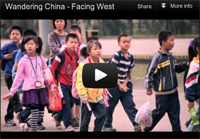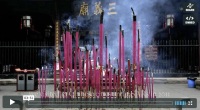Another compelling reason why understanding Singapore helps in understanding China – “Most of these people have a much deeper understanding of Chinese culture and it’s easier to understand China. That constitutes a unique basis for China-Singapore relations. This carries much historical weight.” In some ways, Singapore (in a Chinese cultural sense) is an English-educated model, formerly colonized or otherwise, of China.
– – –
‘Thank you, Singapore’ – Outgoing Chinese Ambassador to Singapore Zhang Xiaokang
by Teo Xuanwei
Source – Today Online, published April 27, 2010
Just days before the end of her three-year term as the highest ranking diplomatic representative of the People’s Republic of China to Singapore, Ambassador Zhang Xiaokang (picture), spoke to Teo Xuan Wei (xuanwei@mediacorp.com.sg) and other members of the media. During the interview, she described bilateral relations as “developing rapidly”. She also praised bilateral people-to-people exchanges and trade ties between the countries.
What is unique about the relationship between Singapore and China?
Ambassador Zhang Xiaokang: The striking difference is (that) … about 75 per cent of Singapore’s population is of Chinese origin. Most of these people have a much deeper understanding of Chinese culture and it’s easier to understand China. That constitutes a unique basis for China-Singapore relations. This carries much historical weight.
The Singapore-China relationship has occupied a very unique place in China’s external relations. Singapore is a very important hub with multi-ethnic groups. Many MNC (multi-national corporation) headquarters are also based here. This means Singapore is a meeting place between Western and Eastern cultures.
In this way, Singapore can play a very good bridging role between China and other countries in this region as well as China and other countries in the world. And through the unique window of Singapore, perspectives to understand China.
Singapore is the last Asean country to establish diplomatic relations with China, however, Singapore is the first to sign a free trade agreement with China.
Some Singaporeans are not as tolerant towards Chinese nationals. How can we improve the understanding on the ground?
Ambassador: There can never be too much people-to-people engagement. Although we have done quite a bit, there’s always room to do more and our officials at the Embassy are always working hard towards that end. It’s not unusual that some Singaporeans may not be used to the ways of China nationals who come here. But I feel that it’s nothing much.
China is so big, even Shanghainese working in Beijing may not be used to how the people there speak or act. The living conditions, habits and cultures even within China are very different. So it’s something quite natural. People-to-people engagement, the more the better.
What has left the deepest impression during your posting here?
Ambassador: It is the harmony in Singapore. That between man and environment, between ethnicities, between religions, as well as between the Government and its people.
This is the 20th anniversary of China-Singapore diplomatic relations. What hopes do you have for relations going forward?
Ambassador: Over the years, bilateral relations, in general, have been healthy and developing rapidly.
In the next 20 years, how will relations develop? First, we’ll have to examine why bilateral relations have developed in this way. I think there are some underlying key factors that have played significant roles to sustain such this very healthy, fast-developing cooperation.
One, China-Singapore relations have received broad support. Whether it’s top-down, the grassroots level or the different quarters of each country, there’s deep commitment and support for cooperation and development.
Two, both sides have deep respect for the other. We are closely linked in terms of our strategies for development. One example is the Tianjin Eco-City. Both sides feel this is a win-win collaboration. These will remain unchanged. We will continue cooperating.
Going forward, our people have to interact more; the younger generation leaders, and the community. Our communities and schools should also organise more cultural exchange programs. To that end, the Chinese Cultural Centre here will be a very good platform to further boost understanding between the two countries. There are many things we can learn from Singapore, for instance, in modern urbanisation. How to develop an energy-efficient, environmentally-friendly city. Singapore’s experience in these areas is very relevant for us.
In 2008, China was devastated by the Sichuan earthquake, delighted by the Beijing Olympics, dismayed by the milk incident, and at the end of the year, all of us were plunged into the recession. As the most senior official representing China here, what were your experiences here?
Ambassador: I’d like to say one word to sum up my experience and feelings for the year 2008, and that is “Thanks”.
Thanks for the sincere support from Singapore’s people for our Olympic games in Beijing, and also for your very generous donations and your deep sympathy for the earthquake-striken Sichuan.
During that period, myself and my colleagues at the embassy here, worked from early in the morning until late at night. To do what? To receive donations from Singapore’s people. Ordinary Singaporeans coming here to contribute their bit to support our people in Sichuan.
We are, we were, and we have been deeply touched and moved by this generous support. All of us said to each other. This kind of moving situation can only be found in Singapore because Singapore’s people, 75 per cent of the population, their ancestors are from China. I think that explains why.
Once again, I’d like to take this opportunity to thank Singapore’s people for their warm-hearted support for everything they offered during the year 2008. Thank you.
What will you miss about Singapore when you return to China?
Ambassador: I will miss the weather, the greenery, but most of all, I’ll miss my friends here. During my time here, I’ve met the best minds of Singapore. I’ve had many thought-provoking conversations with them.
Filed under: Chinese overseas, Culture, Influence, International Relations, Politics, Singapore, Today Online











The Sharing Circle